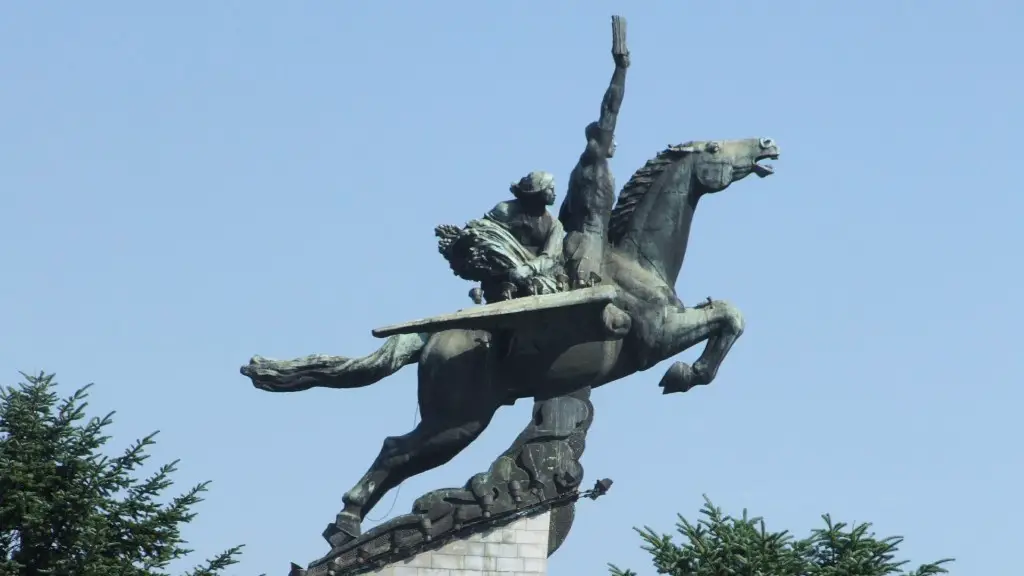Effects of Korea Divided
Since its division in 1945, North and South Korea have led vastly different lives. North Korea has been under a dictatorship since 1948, resulting in little to no international contact and a lack of basic resources for many of its citizens. In contrast, South Korea has been able to build up a strong economy and provide education and healthcare to its people. South Korea has become a regional leader on the global stage, while North Korea remains an isolated nation, with sanctions and its own policies severely limiting contact with other countries.
The effects of this division have been felt sharply in both countries. In South Korea, the divide has led to a significant increase in militarization and the construction of multi-million dollar barriers along the border. This has been necessary to safeguard South Korea against any potential threats from the north, as well as to prevent North Korean citizens from entering the south. In North Korea, the isolation of the country has led to an extremely limited access to resources. In addition, North Koreans are closely monitored by their government, and life for the average person is much more difficult than in its more prosperous neighbour.
Political Ferment
Despite these different paths, the two countries have slowly moved closer together in recent years. In 2018, North and South Korea held their first summit in over a decade, and North Korean leader Kim Jong-un met with US president Donald Trump in Singapore for a historic summit. This marked a major step in the process of diplomatic reconciliation between the two countries.
However, there is still a long way to go. A deep mistrust between the two countries still persists, and while they have made some strides towards normalizing relations, there is still a lot of political and social ferment that prevents further progress.
North Korea’s nuclear weapons program, economic sanctions, and stringent government policies combine to limit any result that may come from cross-border diplomacy, while South Korea is wary of taking any steps that could lead to reunification with its northern neighbor.
The two countries remain divided, with no official timeframe for reunification and a plethora of issues that must be addressed before any unity can take place.
Economic Woes
The economic situation in both North and South is a major factor preventing reunification. North Korea is one of the poorest nations in the world and faces extreme levels of poverty. The sanctions put in place by the United Nations Security Council in 2006 have made it more difficult for the North Korean economy to grow. Over the years, the economy has seen some development, largely thanks to South Korean investment and aid, but these have been extremely limited and the nation still struggles to meet the basic needs of its citizens.
Economically, South Korea is in better shape, but it still faces economic pressures. With the global economic climate rapidly changing, South Korean businesses are struggling to keep up and the nation faces increasing competition from cheaper labor markets in other parts of the world. These economic woes have kept South Korea from making any large-scale investments into the North, preventing it from using aid and investment to help bring about reunification.
Regional Rivalries
Regional politics have also played a major role in the ongoing divide between the two countries. China and other regional powers have long had an interest in the Korean peninsula, and these countries have worked to prevent the two Koreas from reuniting. China is particularly concerned, as a unified Korea could potentially threaten its regional status. These regional rivalries have served as a major obstacle to any attempt at reunification, as any moves towards unity would be immediately met with opposition from these countries.
In addition, the presence of the United States in the region has also had an effect. As a major global power, the US is deeply invested in the region and it has been wary of any rapprochement between the two Koreas, as it could lead to a weakening of its strategic position. This has put a great deal of strain on the peace process and has made it difficult for South and North Korea to come to an agreement.
United Nation’s Involvement
The United Nations has also been an active player in the peace process. The UN has provided a great deal of humanitarian aid to the citizens of both North and South Korea, and it has mediated many of the negotiations between the two sides. However, the UN has been largely unsuccessful in ensuring that the two Koreas implement any of their agreements, as they have often been unable to come to an agreement on any key issues. This lack of progress has slowed down the peace process considerably, and has made it difficult to determine when or if reunification will ever take place.
The UN has also been effective in providing a platform for dialogue between the two sides, allowing them to air their grievances and come to an understanding on certain issues. This has resulted in some progress in the peace process, but it has also led to a number of stalemates as neither side is willing to compromise on certain issues. This has also made it difficult for the UN to determine which side is acting in good faith, making it difficult to move forward with any negotiations.
Attitude Adjustments
Ultimately, the reunification of North and South Korea is dependent on both sides making significant changes to their attitudes. Both sides will have to make compromises and dramatic shifts in their policies and politics in order for progress to be made. North Korea will have to open itself up to the outside world and South Korea will have to make significant investments in the north. This will be a delicate and difficult process, and it may take decades to see an end to the hostilities between the two countries.
Both sides will have to make significant adjustments in order to make reunification a reality. North Korea must recognize the importance of economic and political reform in order to move forward, while South Korea will have to be willing to invest in the north and make sacrifices to help bridge the divide. As of now, these steps have yet to be taken, and it is unclear when or if reunification will ever take place.
Other Major Players
Aside from North and South Korea, other major players in the region will also be involved in any potential reunification process. China, Japan, and the United States are all likely to have a stake in the outcome, and their views on how reunification should take place will be crucial. These countries all have a vested interest in the future of the Korean peninsula, and their involvement will be essential for any peace process to be successful.
In addition, the citizens of the Korean peninsula are likely to have a major influence on the future of the region. South Korean citizens have shown a desire for reunification with the north and have held numerous protests and rallies supporting the cause. This grassroots movement has been a major factor in the process, as it has demonstrated the popular support for reunification within South Korea. It remains to be seen how North Koreans react to the prospect of reunification, but it is certain that the will of the people will be a major factor in any potential peace process.
Prospects for the Future
As of now, there is no clear timeline for reunification and it is unclear when the two countries will reach an agreement. Both sides are deeply mistrustful of one another, and there are a number of issues that must be addressed before any progress can be made. In addition, there are many regional and international interests that must be taken into account if the peace process is to be successful.
However, there is still hope that reunification may be possible. In recent years, both North and South Korea have shown a willingness to reach out to one another, and there have been a number of diplomatic advances which could eventually lead to a lasting peace. If both sides are willing to make the necessary compromises, there may be a chance that the two countries could eventually be reunited.
International Support
The reunification of North and South Korea will likely require the support of the international community. The United Nations will be a key player in this process, as it has a vested interest in the stability of the Korean peninsula. Additionally, countries such as China, Japan, and the United States will be heavily involved, as they will have to make sure their interests are respected and that any potential reunification is on their terms.
The global community will also have to provide economic and humanitarian aid in order to promote development in both North and South Korea. This aid will be essential in ensuring the success of any reunification efforts, as it will help alleviate some of the economic issues that both countries face. In addition, this aid could also help to ease some of the cultural and political tensions between the two sides, making the path towards peace and reconciliation a smoother one.
Reducing Tensions
If reunification is to take place, both North and South Korea will have to take steps to reduce tensions between them. North Korea could potentially do this by implementing a more open economic policy and providing greater access to information for its citizens. South Korea, on the other hand, could make strides towards reducing militarization and playing a larger role on the international stage.
These steps, although small, could signal a more peaceful future for the Korean peninsula. Until then, the two sides will have to remain in a fragile state of coexistence, with no clear timeline or path towards reunification.
Civil Society Engagement
The civil society of both North and South Korea will play an important role in any attempt to bring about reunification. South Korean civil society has already taken an active role in the peace process, staging numerous rallies and protests in support of reunification. Meanwhile, North Korean citizens have yet to make any major public appearances in support of reunification, but the future may bring a greater awareness of civil society movements in the north.
Civil society engagement is essential in any attempt to move towards reunification, as it provides a platform for the two sides to engage one another in an open and constructive manner. This could potentially lead to a greater understanding of the issues at stake, and a viable path forward that both sides could agree on.
Cross-Border Cooperation
Achieving reunification will also require cross-border cooperation between North and South Korea. This will likely involve some degree of economic integration, as both sides will need to bridge the gap between the two economies in order to make progress.
In addition, North and South Korea will also have to take steps towards cultural reconciliation. This will require the two sides to be more open to understanding one another, and to respect the different cultures and values of each nation. It will also involve a willingness to engage in dialogue and cooperation, as well as recognition of the validity of each other’s perspectives and interests.
Cross-border cooperation is the key to unlocking the potential of reunification, and it is essential if any lasting peace is to be achieved.





